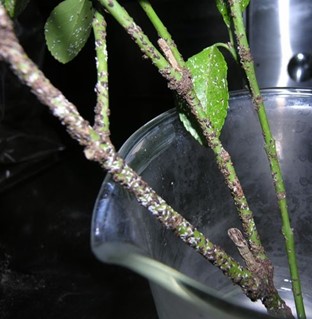Disease Notes
Contact
Sherrie Smith
Plant Diagnostician
Phone: (479) 575-2727
Email: ssmith@uada.edu
Jason Pavel
Diagnostician
Phone: (479) 575-7257
Email: jpavel@uada.edu
Plant Diagnostician
Phone: (479) 575-2727
Email: ssmith@uada.edu
Jason Pavel
Diagnostician
Phone: (479) 575-7257
Email: jpavel@uada.edu
Office:
University of Arkansas System Division of Agriculture
Cralley Warren Building
Room 16
2601 N. Young Ave.
Fayetteville, AR 72704
University of Arkansas System Division of Agriculture
Cralley Warren Building
Room 16
2601 N. Young Ave.
Fayetteville, AR 72704
Euonymus Scale
by Sherrie Smith and Jason Pavel

Euonymus Scale-Unaspis euonymi
Photo by Sherrie Smith, University of Arkansas Cooperative Extension
Euonymus Scale, Unaspis euonymi, is the most common Euonymus problem we see at the Plant Health Clinic. Scale is an
aggravating and serious insect pest of euonymus. Euonymus Scale is such a problem
that many homeowners give up in disgust and remove their infested plants after several
seasons of battling scale problems. These insects can also attack pachysandra, bittersweet,
camellia, celastrus, ivy, hibiscus, holly, and ligustrum.
Scale insects injure plants by using their piercing-sucking mouthparts to feed on
sap. The excess amounts of sugary sap that the insects secrete attract Sooty Mold
fungi that colonize leaves, twigs, and branches, turning them black. Sooty Mold fungi
do not directly injure the plants but may reduce their ability to photosynthesize
by coating the leaves with a heavy black coating. Heavily infested plants grow slowly,
become chlorotic, and stunted. Severe infestations may cause branch dieback and plant
death.

Euonymus Scale-Unaspis euonymi
Photo by Sherrie Smith, University of Arkansas Cooperative Extension
Males are the most easily observed with their elongate white bodies. They can heavily
encrust the leaves and stems of the plant. Females are less noticeable, although larger
(over 1/16 inch long), brown, and pear-shaped. There are several generations a year.
Crawlers are active in May, June, and July.
Plants with poor air circulation are more at risk than those in more open settings.
Over-fertilization and poor watering practices, either too much or too little, promote
scale infestations. Heavily infested plants may be pruned back, and new growth protected
with insecticide treatments. Dormant oils applied during the winter months help reduce
overwintering populations. Fine horticultural oils and insecticidal soaps are options
for summer control. BioAdvanced Tree and Shrub Insect Control (Imidacloprid) is a
systemic insecticide that gives good results, or BioAdvanced Garden Power Force Multi-Insect
Killer (Cyfluthrin).
Spreading euonymus, (Euonymus kiautschovicus), Dwarf Winged euonymus (Euonymus alatus 'Compactus'), and Winter Creeper euonymus (Euonymus fortunei), are more resistant to heavy attacks by this pest than other varieties. Be aware, however,
that Winter creeper is invasive and can become a pest.
Take Aways
- Treat early for plants with a history of scale infestations.
- Systemic insecticides give the best results.
- Plant resistant varieties.